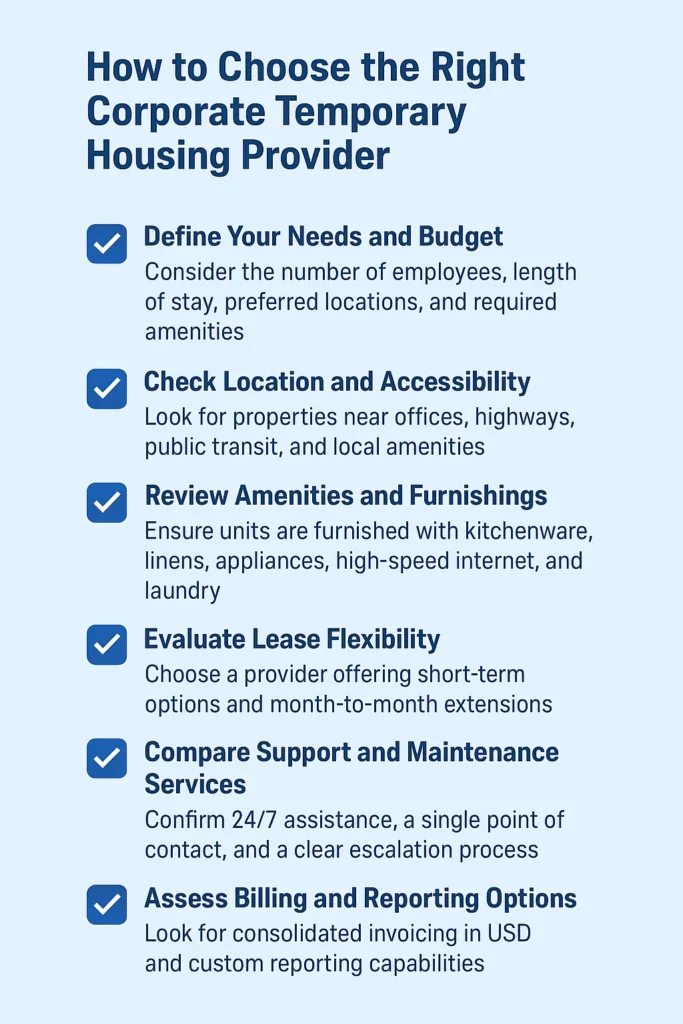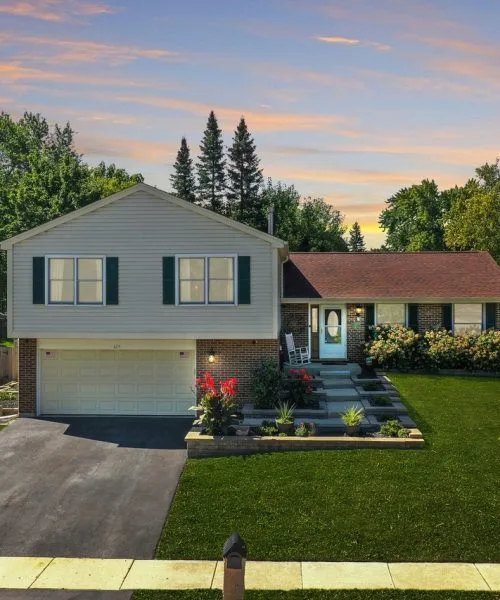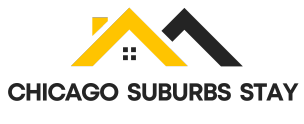Corporate temporary housing is short-term, fully furnished accommodation designed for business travelers, relocating employees, or project teams. It offers the comfort of a home, with kitchens, laundry, and work-ready spaces, alongside flexible leases and simplified billing, making it more practical and cost-effective than extended hotel stays.
Key Takeaways
- Move-in ready options across key Chicago suburbs for quick starts.
- Single coordinator streamlines requests, billing, and reporting.
- Flexible lease terms adapt to uncertain schedules and project changes.
- Fully equipped living spaces give privacy and work-friendly areas.
- Consolidated USD billing and custom reports simplify finance and compliance.
- 24/7 assistance and scalable inventory reduce downtime for teams.
What Is a Corporate Temporary Housing
Corporate temporary housing refers to fully furnished, short-term rental accommodations designed to meet the needs of business travelers, relocating employees, project teams, and contractors on assignment.
Unlike hotels, these residences, often apartments, condos, or single-family homes, provide a complete living environment with kitchens, laundry, and separate living spaces. The goal is to offer a home-like setting that supports both work and daily routines during extended stays, typically lasting a few weeks to several months.
Corporate temporary housing also comes with flexible lease terms, consolidated billing, and support services that make it easier for companies to manage placements and for employees to stay comfortable and productive while away from their permanent residence.
Who It’s For and Why It Works Better Than Hotels for Short-Term and Extended Stays
When assignments last several weeks or months, you need lodging that feels like a functioning home. Furnished residences give separate bedrooms, living areas, and in-unit kitchens so people rest, eat, and work more naturally than in a hotel.
Typical users include:
- Business travelers on multi-week engagements who need more space and privacy than a single hotel room.
- Relocating employees who need a stable base to explore schools, commutes, and neighborhoods during an average three-month term.
- Government staff and cost-reimbursable defense contractors who require approved providers, consolidated billing, and clear reporting.
- Project teams placed near client sites who benefit from collaborative living and lower per-person costs than multiple hotel rooms.
Why this option often outperforms hotels: In-unit kitchens and laundry cut per diem and incidental fees. Residential locations reduce commute fatigue and improve on-time arrival. You can scale units up or down quickly when headcount changes, and 24/7 support preserves duty-of-care for all travelers.
| Comparison | Furnished Residences | Hotels | Impact for Your Team |
| Space & Privacy | Separate bedrooms and living rooms | Single-room layouts | Better rest and focus in residences |
| Cost Drivers | Lower per diem via kitchens and laundry | Higher meal and incidental expenses | Reduced total cost of stay with residences |
| Program Controls | Consolidated billing and reporting | Individual bills per booking | Easier compliance and audits with residences |
| Location & Commute | Residential, near schools and retail | Often near commercial centers | Faster commutes and local integration with residences |
How to Choose the Right Corporate Temporary Housing Provider
Selecting the right corporate temporary housing provider in the Chicago suburbs can make a huge difference in both cost efficiency and employee satisfaction. A well-chosen provider ensures that business travelers and relocating staff enjoy a seamless transition, while companies benefit from simplified administration, predictable costs, and reliable support. Here are the key steps to guide your decision:
Define Your Needs and Budget
Start by clarifying what you need from a temporary housing arrangement. Consider the number of employees, length of stay, preferred locations, and required amenities. Outline your budget in advance so you can compare providers based on both price and value, not just the lowest cost.
Check Location and Accessibility
Proximity to offices, client sites, highways, and public transportation is critical. Look for providers with properties in suburbs like Naperville, Oak Brook, Schaumburg, or Downers Grove, where commutes are manageable and local amenities like retail, dining, and parks improve the living experience.
Review Amenities and Furnishings
Not all temporary housing is created equal. Verify that units are fully furnished and include essentials such as kitchenware, linens, appliances, high-speed internet, and in-unit laundry. These details help employees settle in quickly without added costs or setup time.
Evaluate Lease Flexibility
Projects and relocations often shift timelines. Choose a provider that offers flexible lease terms, including short-term options, month-to-month extensions, and easy date adjustments. This ensures you won’t be locked into rigid contracts if plans change.
Compare Support and Maintenance Services
Round-the-clock support is essential, especially for traveling employees. Ask whether the provider offers 24/7 assistance for lockouts, maintenance requests, or emergencies. A single point of contact for all service needs saves time and reduces stress.
Assess Billing and Reporting Options
For companies, streamlined billing is a major benefit. Look for providers that consolidate invoices in USD and can generate customized reports tied to cost centers or project codes. This simplifies compliance, auditing, and financial tracking.
Ask About Scalability for Teams
If you’re placing multiple employees, find out whether the provider can accommodate groups in the same building or nearby units. Scalable solutions allow you to expand or reduce housing inventory based on headcount without sacrificing consistency.

Relocation Temporary Housing in Lake Zurich, IL
If you’re relocating to Lake Zurich, IL and need temporary housing in the Chicago suburbs, you’ll find several excellent options designed to fit different lifestyles, family sizes, and preferences. Whether you’re moving for work, handling an insurance claim, or in transition between homes, these properties offer comfort, flexibility, and convenience.
1. 975 Old Mill Grove Rd, Lake Zurich, IL 60047

This spacious 4-bedroom, 3-bathroom home spans four levels, making it ideal for families, professionals, or anyone needing a comfortable relocation temporary housing solution.
The property is available furnished or unfurnished, giving you the choice of moving in with your own style or enjoying a ready-to-live-in setup. It’s also perfectly suited for ALE (Additional Living Expense) insurance housing, corporate relocation, or family stays.
Key Features:
- Bedrooms: 4
- Bathrooms: 3
- Living Area: 250m² across 4 floors
- 2-car garage and free zone parking
- In-unit laundry and high-speed internet
- Furnished or unfurnished options
- Pet-friendly with spacious garden
- Swimming pool and gym access
- Flexible lease terms (available starting 10/1/24)
This home combines convenience and flexibility, making it a standout choice for relocation temporary housing in Lake Zurich.
2. 375 Pebblecreek Dr, Lake Zurich, IL 60047

This 3-bedroom, 2-bathroom property offers 250m² of living space with a modern, fully furnished design. Perfect for those seeking a hassle-free stay, all utilities are included, ideal for relocation or transitional housing needs.
Key Features:
- Bedrooms: 3
- Bathrooms: 2
- Modern furnishings with cozy, contemporary style
- Living Area: 250m² across 3 floors
- 2-car garage and free zone parking
- High-speed internet included
- Spacious private yard for relaxation or gatherings
- Swimming pool, gym, and local park access
- Flexible lease terms to suit your schedule
With its combination of comfort, style, and included utilities, this property is an excellent option for relocation temporary housing in Lake Zurich, IL.
Conclusion
Wrap up your lodging plan with a solution that keeps teams productive and administrators in control.
Place talent where work happens across Oak Brook, Schaumburg, Naperville, Downers Grove, and nearby suburbs with flexible lease options that adjust to shifting timelines.
Every unit arrives ready: kitchen, housewares, linens, home electronics, basic cable or streaming, and high-speed internet so your people work from day one.
Simplify administration through a single point of contact, 24/7 assistance, consolidated USD billing, and customized reporting that matches your finance and compliance needs.
Scale confidently and improve traveler satisfaction by choosing a residential model. When you’re ready, pick dates, select unit types, and confirm placements with fast onboarding.
FAQs
How far in advance should I book corporate temporary housing in the Chicago suburbs?
It’s best to book at least 30–60 days in advance, especially if you need housing during peak corporate travel or relocation seasons. This ensures the widest selection of units and allows time to coordinate specific needs such as pet-friendly housing or multiple team placements.
Are corporate temporary housing units pet-friendly?
Many providers in the Chicago suburbs offer pet-friendly units, but availability may be limited. Additional deposits or monthly fees might apply, so it’s important to request this feature when booking.
Can temporary housing be customized for large project teams?
Yes. Providers often scale inventory to accommodate teams by placing employees in the same complex or nearby properties. This creates convenience for collaboration while still giving each traveler a private residence.
Is corporate temporary housing more cost-effective than hotels?
For multi-week or multi-month stays, yes. Having in-unit kitchens and laundry reduces dining and incidental expenses, while bundled utilities and consolidated billing cut administrative costs. Teams often save significantly compared to extended hotel stays.
Can leases be extended if projects run longer than expected?
Yes. Flexible lease extensions are a core feature of corporate temporary housing. Many providers allow month-to-month extensions so you can easily adjust your stay without relocating to a different property.
What support is available in case of emergencies or maintenance issues?
Most providers offer 24/7 support for emergencies like lockouts, utility problems, or urgent maintenance needs. This ensures business travelers don’t lose productivity and can focus on work instead of housing issues.

